Apr 2012
Apr 2012 sadminAiming high for job creation targets
Aiming high for job creation targets sadminEmployment news
The Eastern Cape aims to create a total of 116 958 jobs this year.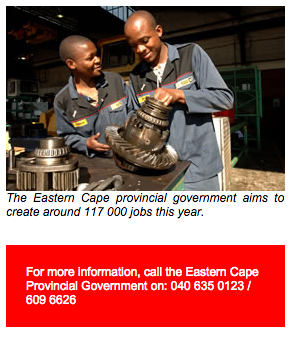
Premier Noxolo Kiviet said although the country’s unemployment rate had decreased, the provincial unemployment rate of 27,1 per cent was still high. “However, we are pleased to report that out of a target of 94 504 job opportunities announced for Phase 2 of the Expanded Public Works Programme, a total of 110 472 work opportunities have to date been created in the province. In the coming financial year, our target is to create 116 958 work opportunities.”
Despite the uncertainty in the global economy, the province’s two Industrial Development Zones (IDZs) were delivering much-needed investment.
The East London IDZ is securing private investors to the tune of R4,063 billion in various sectors including the automobile, renewable energy and business process outsourcing sectors.
Green economy
Of the more than R4 billion, R3,3 billion is earmarked for two renewable energy projects – he Langa Renewable Energy Project in Berlin and the Ikhwezi Photovoltaic Project. “It is clear that our focus on the green economy is starting to pay dividends,” said Kiviet.
In the other zone, the Coega IDZ, 3 645 construction jobs, and 2 985 direct jobs have been created.
An additional a R7,6 billion projects are in the pipeline.
The province has already conducted feasibility studies for the construction of a dam to be built in the former Transkei part of the province, using the Umzimvubu River as the source to expand agricultural production.
“Other water infrastructure development projects include seawater desalination in Port Elizabeth and Port Alfred,” Premier Kiviet explained.
Energy infrastructure
In the meantime, the province has concluded talks with power parastatal Eskom to invest over R10 billion in energy infrastructure over the next six years. This includes the increasing transfer of power to the Nelson Mandela Bay and Buffalo City Metropolitan Municipalities. It will also strengthen the integration of the KwaZulu-Natal-East London line, which will improve energy supply to Mthatha and the rest of the province.
“We are pleased to announce that the Alfred Nzo region will be serviced by Eskom in the Eastern Cape, and no longer KZN as it has been the case,” said Kiviet.
Regarding road infrastructure, jobs will be created with the construction of the N2 Wild Coast, which will cost approximately R9 billion.
“It is estimated that this project will create well in excess of 6 800 direct jobs and open up the Wild Coast and key towns such as Port St Johns for investment and economic development.”
-BuaNews
Anti-corruption drive claims top suspects
Anti-corruption drive claims top suspects sadminGovernment priorities
It will soon be the end of the road for suspects of serious corruption. Government is set to meet its target of arresting and prosecuting 100 people suspected of fraud and corruption who have more than R5 million in illicit assets, 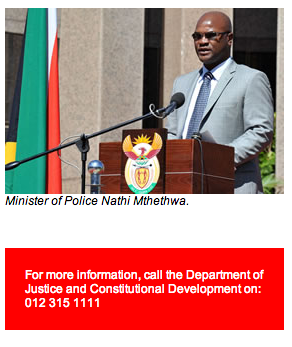 by April 2014.
by April 2014.
Justice and Constitutional Development Minister Jeff Radebe said significant progress had been made towards reaching this target in the first 18 months since coordination of the law enforcement agencies had been improved.
Led by the anti-corruption team, 56 people were being investigated between April and December 2011. Of these, 26 had been arrested and appeared in court, while 19 had their assets to the value of R579 million frozen. In 2012, an additional 32 people will be investigated.
The current priority case investigation involves a total of 157 suspect persons. "Through concerted efforts and coordination, the impact of our work is beginning to be felt. This, we believe, will have a deterrent effect on potential offenders," Minister Radebe said.
He continued saying more South Africans were joining the fight against crime in general, and called on everyone to continue to take part in anti-corruption campaigns.
Continued police training, equitable distribution of policing resources and the creation of a professional police force will be consolidated during this and next year as part of anti-corruption measures.
-Francis Hweshe, BuaNews
Better trains to steam in soon
Better trains to steam in soon sadminEmployment news
A passenger rail transport system that will make South Africans proud will soon be on track. In addition, some 65 000 jobs will be created.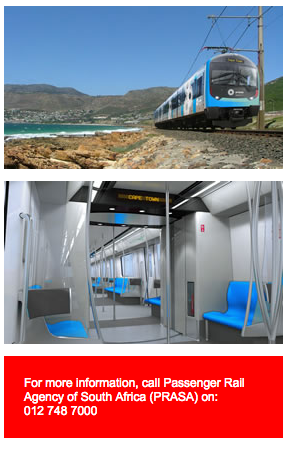
The Passenger Rail Agency of South Africa (Prasa), which is responsible for the provision of passenger rail services, has rolled out a Stock Fleet Renewal Programme aimed at bringing passenger rail services up to standard and creating jobs.
A study has found that trains used by Metrorail, a division within Prasa, has aged beyond its economic life. This has led to high maintenance and refurbishment costs, inefficient rail service, customer delays and customer dissatisfaction.
The study also pointed out that it would be uneconomical for Prasa to continue with the existing rolling stock (locomotives,railroad cars and coaches) fleet and that the entire fleet needed to be replaced.
New coaches
“The people of South Africa must have a mode of transport that they will be proud of,” said Prasa CEO Lucky Montana. He said some of Prasa’s trains were built more than 50 years ago and desperately needed to be replaced with more efficient coaches and locomotives.
Some of the old coaches will become museum pieces at railway stations and others will be leased to other African countries.
The renewal programme will see an estimated 7 224 passenger coaches being bought and introduced into Metrorail between 2015 and 2035, over a period of 20 years.
Montana said the new trains would look completely different from the ones currently in use; they would be fitted with public announcement systems and information screens indicating the name of the station that the train was approaching and would be more energy efficient.
Local content
Two 10-year contracts will be awarded to manage the local content aspect of the project, which it is hoped will exceed 70 per cent.
The total cost of R136 billion will see the project create 65 000 direct and indirect jobs.
Of the total amount, R13 billion will be spent on infrastructure development and about R3 billion on the construction of new depots in Cape Town and Gauteng.
The first new trains are expected by 2015. Metrorail expects to receive in the region of 500 to 600 coaches a year until 2032.
-Samona Murugan
Celebrating our freedom
Celebrating our freedom sadminAdvice and Events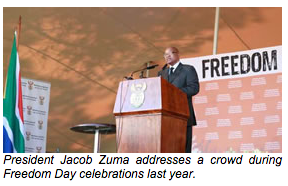
On 27 April each year, South Africans observe Freedom Day to commemorate the first democratic elections held on this date in 1994. This day also serves to remind us of the struggle for a free and just South Africa and the achievements we have made as a nation.
National Freedom Day encourages South Africans to participate in the commemoration of the struggle to build a non-racial, democratic South Africa in which we all have the freedom to prosper.
This year's Freedom Day theme - "Joining Hands to Celebrate 100 Years of struggle for Human Rights and Constitutional Democracy" - coincides with the formation of the South African Native National Congress (which later became the African National Congress (ANC) in 1912.
The road to democracy
The road to democracy was a long and difficult struggle of resistance against oppression by a minority government. The resistance movement became formalised with the formation of the ANC.
The ANC and its allies sought freedom for all its people and continued to challenge the unjust apartheid laws. When The Congress of the People, held in Kliptown in 1955, adopted the Freedom Charter, the blueprint for a democratic South Africa was laid.
The Charter affirmed that, "South Africa belongs to all who live in it, black and white, and that no government can justly claim authority unless it is based on the will of the people."
Following the Soweto Uprising of 1976, the liberation struggle gained momentum. Trade union movements started to revive and assert the rights of workers. Hundreds of residents' associations, as well as sports, student, women's and religious organisations joined the resistance struggle.
By 1988, a stalemate had been reached and the apartheid government started looking for a way out. As a result, negotiations were started with the ANC leadership. This eventually led to the unbanning of the ANC, the South African Communist Party (SACP), the Pan African Congress (PAC) and other organisations on 2 February 1990.
Non-racial constitution
A non-racial, interim constitution was negotiated in 1993 and paved the way for the establishment of the first democratic government following the 27 April 1994 general election.
President Nelson Mandela was inaugurated as the President of South Africa on 10 May 1994.
The Constitution of the Republic of South Africa, 1996, was approved by the Constitutional Court on 4 December 1996 and took effect on 4 February 1997.
Significance of Freedom Day
Today, we celebrate Freedom Day to mark freedom for all South Africans.
The day is also an opportunity for government to reaffirm its commitment to consolidate democracy and promote cultural diversity and social cohesion. This is done in a system that guarantees that never again will humanity be taken from any South African, irrespective of race, gender, creed or sexual orientation.
In commemorating the heroes and heroines and the role played by ordinary citizens in the country and abroad, government calls on everyone to unite in creating a better future for all.
Nation-building requires all South Africans to live by example, ensuring that the values and principles enshrined in our Constitution become a lived reality in the development of fully functioning communities.
- Louise van Niekerk
E Cape learners learn to speak their minds
E Cape learners learn to speak their minds sadminYouth matters
More than 100 Eastern Cape learners took over the province's legislature to participate in an inter-school debate competition recently.
The State of the Province Address Schools’ Debates competition, hosted jointly by the Office of the Premier and the provincial Department of Education, was aimed at fostering interest in government programmes for the youth and to improve learners’ public speaking abilities.
“The provincial government is concerned about the non-participation and lack of interest among the youth in government programmes, which led to the competitions being introduced. The aim is to involve and expose young people to the work of government,” said spokesperson for the Office of the Premier Manelisi Wolela.
Participants were selected during regional competitions where they debated Premier Noxolo Kiviet’s State of the Province Address.
Enhancing education
“These debates are also aimed at engaging children in activities that enhance their education. Debate and public speaking are very important, and we hope they carry this skill through to tertiary level,” said Office of the Premier chief co-ordinator Nomfundo Nqinana.
Sipho Dlebusuku,15, a Grade 10 learner from Enoch Sontonga Secondary School, said the competition was a great way of informing young people about how government works.
“I really hope that our school gets to participate in the competition. It is a big step towards grooming future leaders,” said Dlebusuku.
Career guidance
Staff and students from Fort Hare and Walter Sisulu Universities will also be involved in the competition, offering career guidance to the pupils.
Prizes include certificates signed by Premier Kiviet and Education MEC Mandla Makupula for all participants, sets of encyclopedias, and trophies for the winning school and individual pupils.
-Sithembele Sakati, BuaNews
Empowering women beats poverty in the Eastern Cape
Empowering women beats poverty in the Eastern Cape sadminGovernment priorities
People in rural areas do not have to relocate to the cities to access a better life, said Minister of Women, Children and People with Disabilities, Lulu Xingwana.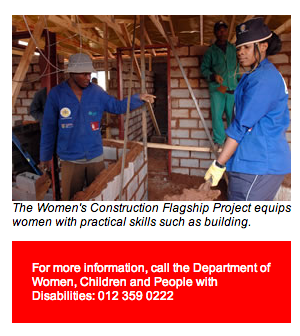
Unveiling the Women’s Construction Flagship Project in Caguba in Port St Johns, she said, “Equipping women with skills will help us win the war on poverty and unemployment.” The project, which gives hope for a better life to many impoverished families in the area, marked the roll-out of various rural development projects that target women, children and people with disabilities. These include a women’s multi-purpose centre for income-generating activities, a children’s park and a memorial community hall.
Minister Xingwana said these interventions were meant to address the lack of recreational facilities for children and youth, address unemployment, poverty and lack of skills development, particularly for rural women and people with disabilities.
Cutting extreme poverty
She said government wanted to promote and facilitate the active participation of women and people with disabilities in infrastructure development and economic empowerment.
“Today we are launching a rural women’s construction flagship project, which we want to ensure becomes a sustainable development project for women in this village of Caguba. Through this project, we seek to eradicate extreme poverty and to promote gender equality and empower women.”
Through the Port St Johns Project, the department would leave behind a team of local women who would be empowered to continue to run and manage the project on their own, Minister Xingwana said.
“We want to come back here one day and arrive to a community where economic development has taken shape, a community where there will be food in households.”
Partnership
The Women’s Construction Flagship Project is an excellent example of an integrated approach to service delivery where the Department of Women, Children and People with Disabilities is working in partnership with the municipality and other government departments. These include Human Settlements, Public Works, Sport and Recreation SA, Cooperative Governance and Traditional Affairs.
-Cornelius Monama
Farming together we can do more
Farming together we can do more sadminGovernment priorities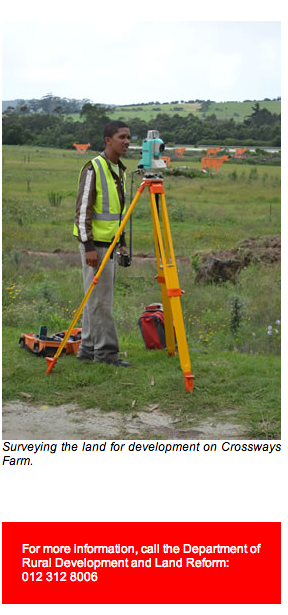
The Crossways Farm Village project in Thornhill near Port Elizabeth is the first of its size in South Africa to combine a rural residential development with scientifically based farming. Many new jobs, as well as new opportunities for investors are also being created.
For ten workers who had been on Crossways Farm long before it was earmarked for development, the Crossways Farm Village project has brought unexpected benefits. They will be rewarded for their hard work with stands valued at R400 000 each, registered in their names.
One of the excited beneficiaries, 46-year old Vuiyisile Tshunungwa, had never owned any property before. The thought of owning some land touched his heart deeply and would change his life, he said. "I encourage others who dream of owning property to be patient and never lose hope".
Crossways Farm Village fits in perfectly with government's rural development strategy. When completed, it will have created nearly 3 000 permanent jobs in a largely farming area. It will also have expanded existing irrigation pastures and a dairy farm, which is in line with the government's commitment to food safety.
Profits of the business will be split between the homeowners association, the farm management and the farm workers.
Dairy farm
In its motivation for approving the concept, the Eastern Cape Ministry for Agriculture, Forestry and Fisheries said the village offered the opportunity for rural development and economic stimulation, job creation, equity and ownership to previously disadvantaged people, as well as training and mentoring of emerging farmers, education and the expansion of existing agricultural activities.
At the heart of the development will be a fully operational dairy farm with a 500-strong herd of stud Holstein cows. Once this is up and running, fruit orchards and vegetable farming will follow. All dairy products and agricultural produce will be available to the residents.
Property ownership
While officially launching the construction phase of buildings at Crossways Farm Village recently, Rural Development and Land Reform Minister Gugile Nkwinti, said what was happening at Crossways was in line with the spirit of sustainable property ownership contained in the Green Paper on Land Reform. "It fulfils government's goal of creating vibrant, equitable and sustainable rural communities and food security for all."
The Minister said the concept of an agri-village was part of the department's agenda and promised that the department would work in partnership with the Crossways community. "We want to move with you as fast as possible," he said.
He commended the developers of Crossways for including the whole of Ward 7 of the Kouga Local Municipality in their strategic plan. "We want Kouga to be industrialised soon."
The Kouga Local Municipality's territory includes small towns like Jeffreys Bay, Oyster Bay, Hankey, Patensie and Humansdorp, which have the potential for economic growth. Ward 7 of Kouga has rural areas like Loerie, Thornhill, Kleinfontein and Longmore.
-T K Sonjica, Department of Rural Development and Land Reform
Govt honours top teachers
Govt honours top teachers sadminGovernment priorities
The Department of Basic Education celebrated the 12th anniversary of its National Teaching Awards this year.
This signifies "a landmark calendar event for the South African community to pay tribute, appreciate and salute teachers whose extraordinary efforts and contribution are the pride of the nation", said Minister of Basic Education, Angie Motshekga at the awards ceremony.
She said teachers who received the awards played a vital role in shaping our future leaders. "To the winners, we hope your candle will light other candles in pursuit of quality learning and teaching'" the Minister added.
The theme for this year's awards is 'Celebrating the heroes of yesterday, recognising today's achievements and motivating teachers for tomorrow.'
Mmipe George Mokgehle, Toronto Primary School, Limpopo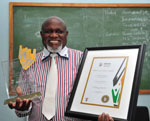
Lifetime Achievement Award
With more than 32 years' experience as a teacher, one could easily dismiss Mmipe George Mokgehle as one of the traditionalists of the profession. However, he is one of the few who have embraced technology in the classroom and harnessed it to deliver innovative lessons of a high standard.
Mokgehle, who has been at Toronto Primary for 7 years, teaches Technology and Computer Systems to Grade 7 learners. He says Technology is the best thing to have happened to teaching; it has revolutionised the profession and brought energy and innovation.
His particular area of focus is indigenous knowledge systems in biodiversity conservation where his learners conduct research on indigenous herbs and trees in the school garden.
Mokgehle makes sure other schools in his area also benefit from his information technology skills. Through his network he has made it possible for 47 schools to receive 21 computers and printers each and has also organised computer training for about 200 teachers at these schools.
He has received several awards in recognition of his creative use of technology. These include Best Presentation of Maths and Afrikaans in 1987, ISPA ICT Champion, Super Teacher of the Year, Microsoft Peer Review and ICT Top Teacher in Africa.
"I wanted to help unleash the potential in children, especially those from poor backgrounds, to use education as a way of breaking out of the cycle of poverty and hopelessness. I want every child who passes through my hands to become part of the knowledge community and, more importantly, to be a responsible citizen."
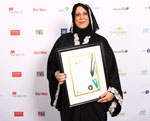 Shehnaz Essop Saloojee, Zinniaville Secondary School, North West
Shehnaz Essop Saloojee, Zinniaville Secondary School, North West
Excellence in Primary School Teaching Award
Shehnaz Saloojee believes teaching is not a profession but a calling. As such, a teacher should always focus on giving the best possible education to children. "When I leave this world, I want to be remembered as someone who taught my learners how to read and write; not for the clothes I wore, the car I drove or the house I lived in," she says.
Saloojee, a Grade 6 and 7 English teacher, has gained valuable experience and insight during her teaching career of 26 years. She believes children should be equipped with the latest skills to prepare them for today's technologically challenging world.
The school caters for learners from mostly poor households and the majority cannot speak English. Saloojee ensures that her lessons are activity driven and uses relevant teaching aids and visuals. She also introduced "peer-tutoring" and "paired-reading" groups to promote a culture of reading among learners.
"I find involving learners in real-life situations and practical classroom activities very effective," she says.
Selfless and caring by nature, Saloojee has spread her love by adopting one of her learners infected with HIV.
 Francois Naudé, Hoërskool Florida, Gauteng
Francois Naudé, Hoërskool Florida, Gauteng
Excellence in Secondary School Teaching Award
Francois Naudé is a qualified zoologist who should be rubbing shoulders with eminent professors at a university laboratory. Instead, he opted for a profession he finds more fulfilling: teaching. A Grade 8 to 12 Life Sciences teacher, Naudé realised he would make a good teacher when he was teaching first-year students during his fourth year at the University of Johannesburg.
"The students and some of my friends told me how good I was at explaining things and I decided to give it a try. I've never looked back." Naudé believes the school environment complements his love for working with children and his interest in sport, culture and community service.
"It is the only place where all these spheres come together," he says. His preferred teaching method is using the latest technology such as You Tube, music, movies and games, as well as a good dose of humour. He also believes in the importance of demonstrating theoretical information through practical experiments.
Naudé says learners' ignorance of the negative influence of HIV and Aids is a major challenge. Most of them think it is something that will never happen to them. Gender stereotyping is another challenge. "Young girls, for example, still associate science and technology with white males. This is why is I encourage them to follow their passions, work hard and believe in themselves."
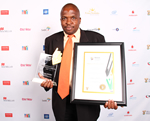 Sentsho Rapoo, Bachana Mokwena Primary School, Gauteng
Sentsho Rapoo, Bachana Mokwena Primary School, Gauteng
Excellence in Primary School Leadership Award
When Sentsho Rapoo became principal of Bachana Mokwena Primary School in 2006, he brought with him a wealth of practical experience and ideas on how to establish an effective teaching and learning environment. This included setting up a computer centre and growing a food garden to feed disadvantaged learners.
When he arrived at Bachana Primary, an RDP residence, there was not "a single scrap of furniture," he says. Engaging parents to organise chairs and mobilising businesses to support the school with resources, Rapoo also approached a number of companies to donate items. The Department of Agriculture installed a borehole and provided some farming equipment, which helped them to start a vegetable garden.
Today, the school is rated Level 4 in quality assurance by the External School Evaluation System and is the only school in the district with that ranking.
"We set clearly defined, measurable targets and we have a monitoring system in place. There are also incentives such as academic regalia for learners when they complete a grade."
Rapoo, who has 700 learners under his wing, says his biggest challenge now is that everyone wants to bring their children to his school!
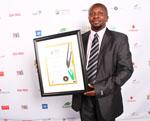 Velaphi Simon Magwa, Phillipolis high School, Free State
Velaphi Simon Magwa, Phillipolis high School, Free State
Excellence in Secondary School Leadership Award
Velaphi Magwa's approach to leading a school is based Velaphi Magwa's approach to leading a school is based on three principles: "Be in class on time, teach and know your learners' home situation."
Magwa is head of a no-fee school with 308 learners. and describes his leadership style as democratic and transparent, especially when it comes to issues of finance. "I believe in keeping people informed and having a sense of ownership of their roles in the school," he explains.
Since taking over in 2007, he has managed to reduce the problems that impeded good performance dramatically. Under his leadership, challenges such as ethnic tension, drug abuse and low parental participation are dwindling, while academic performance is increasing every year.
In 2010, the general pass rate was 94 per cent and in 2011 it increased to just under 97 per cent. Magwa attributes this to involving parents and the community in the school's activities and motivating them to take ownership of the school.
Magwa attributes his success and winning the award to the support of the community; without them he would not have been able to raise the profile of the school to where it is today.
 Leigh Michael Dunn, Formosa Primary School, Western Cape
Leigh Michael Dunn, Formosa Primary School, Western Cape
Excellence in Special Needs Teaching Award
As a special-needs teacher at Formosa Primary SchAs a special-needs teacher at Formosa Primary School, Leigh Dunn's motto is: "Even the smallest star can shine in the darkness." The energy he exudes, his accomplishments so far and his vision for his learners' future make him a beacon of hope at the school. "We should never underestimate even the least significant of our learners," he says.
Learners at Formosa are from different socio-economic backgrounds and have a wide spectrum of learning challenges. To cater for these special needs, Dunn designed a curriculum that is specific to each need and includes elements such as developed pre-reading activities, school readiness activities and basic skills such as learning how to handle a pen. An example of his curriculum is the use of art to teach mathematics.
Working closely with NGOs for expertise, support and sponsorship helps Dunn to accomplish this challenging task.
Nelson Mandela, who achieved greatness despite the odds of growing up in a deep rural area in apartheid South Africa has always been an inspsiration to him. "If one man from humble beginnings can change a country, my vision can change the world."
He is very pleased that Parliament has employed physically challenged people, including the blind. "This gives me encouragement that in my classroom there could be world leaders in the making."
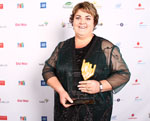 Belinda Harmse, Woel en Werkskaf Pre-Primary School, North West
Belinda Harmse, Woel en Werkskaf Pre-Primary School, North West
Excellence in Grade R Teaching Award
"It is not how much we do as teachers, but how much love we put in the doing. It is not how much we give, but how much love we put in giving," says Belinda Harmse, who has been at Woel en Werskaf Pre-Primary School for five years.
"The task of a teacher is to polish each and every gem [child] for God," she adds.
Harmse, who has been a teacher for 24 years, knew this was what she wanted to do from the age of 10. "I know where my heart lies. I just cannot to do any job other than teaching." Even when her brother asked her to manage his coffee shop in Hermanus near Cape Town, she turned his offer down.
She believes that every child learns and behaves better when he or she receives a high level of trust, acceptance and generosity from their teachers; in Grade R the most important thing is to help children develop a positive self-image and to believe that they are winners.
Harmse's teaching methods also include peer group learning and fantasy play. Peer group learning involves teaching learners about the importance of working together and helping one another. Fantasy play exposes children to a wide range of career options they can pursue when they leave school.
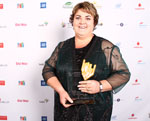 Bernadette Joy Bailey, Worcester Community Learning Centre, Western Cape
Bernadette Joy Bailey, Worcester Community Learning Centre, Western Cape
Excellence in Adult Basic Education and Training (Abet) Award
The energy and enthusiasm Bernadette Bailey exudes as the head of 13 different Abet sites in Worcester is inspiring. Not surprisingly, she has received several accolades for her work, including merit awards, scholarships, Abet awards and a an a award for the best skills centre of the year.
In addition to supervising the 13 Abet sites, Bailey is also a substitute teacher at her resident site, Worcester Community Learning Centre. The centre, which teaches Level 1 to 4 and Grade 12, offer a wide variety of activities, ranging from sports to computer literacy courses, growing vegetables and teaching small, medium and micro-enterprise development.
Bailey's mission is to raise awareness of the value of adult education. "We are tapping into the government's five-point system," she says. Her concern is that the Abet system is generally undermined by those who see it as worthless. She would therefore like to see the term changed to something more meaningful.
Constant monitoring and evaluation is at the top of Bailey's list of priorities to keep optimum levels of efficiency. This gives the centre the edge to remain on top of things and to perform well.
For more information, call the Department of Basic Education: 012 357 3000 or Hotline 0800 202 933.
-Samona Murugan
Great strides in rural job creation
Great strides in rural job creation sadminEmployment news
Job creation initiatives in rural areas have seen positive strides in creating work opportunities during the past financial year especially for the youth.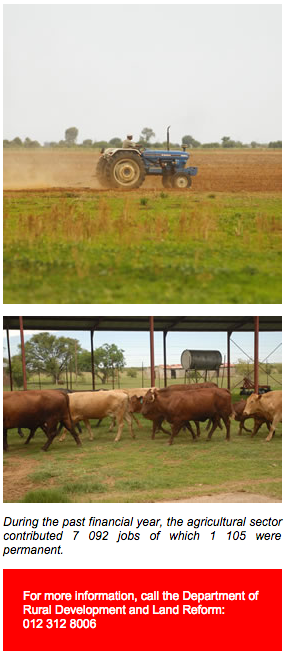
"While the vulnerable groups, particularly women, have been linked to income generating activities, it is the youth that has benefited the most in terms of skills development programmes and jobs created", said Rural Development and Land Reform Minister Gugile Nkwinti.
He said a total of 7 398 youth had been enrolled in the National Rural Youth Service Corps (NARYSEC) programme in 2010 and further 5 000 are being recruited.
NARYSEC is a two-year programme aimed at empowering rural youth from each of the 3 300 rural wards throughout the country. Participants are unemployed young people from rural areas, aged between 18 and 35.
Community works programme
The Minister noted that the Expanded Public Works Programme (EPWP) was another programme that made an impact on employment through creating 540 423 work opportunities and 137 525 permanent jobs. Of these, 66 355 were under the Community Works Programme.
The agricultural sector, including the Comprehensive Agriculture Support Programme, contributed 7 092 jobs of which 1 105 were permanent.
The housing and infrastructure sector also contributed significantly to job creation and skills development through the use of local labour, Minister Nkwinti said. The environment and culture sector of the EPWP had created a total of 307 731 work opportunities by the end of last year.
Nkwinti said initiatives to improve employment opportunities and economic livelihoods included an aquaculture (farming of organisms harvested from the sea such as fish, shellfish and plants) programme and an inland fisheries programme to be launched this year.
The Department of Trade and Industry was expanding its efforts to support the processing of materials derived from agricultural products (agro-processing) such as local maize milling in rural areas. These efforts are supported by the Department of Agriculture, Forestry and Fisheries.
-BuaNews
International relations: SA and Nigeria to strengthen relations
International relations: SA and Nigeria to strengthen relations sadminInternational relations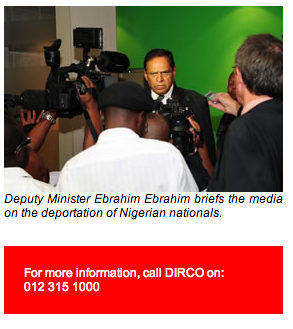
The governments of the Republic of South Africa and the Federal Republic of Nigeria are considering implementing various measures to strengthen the historic bilateral relationship between the two sister African countries.
South Africa and Nigeria have long-standing bilateral relations and share a common commitment to the unity and prosperity of the African continent.
Notwithstanding the above, recent unfortunate events involving immigration matters may have created contrary impressions.
Deported
On 2 March 2012, 125 Nigerian citizens were deported from the OR Tambo International Airport for allegedly being in position of fraudulent yellow fever vaccine certificates. On this day, there was an operation at OR Tambo International Airport to check all passengers arriving from countries which require yellow fever certificates.
Subsequent to that, 28 South African citizens were deported from Lagos, Nigeria, after arriving at the Murtala Muhammed International Airport on a South African Airways flight on the evening of 5 March 2012.
The passengers were deported on grounds of invalid documentation and relevant health certificate clearance. Some passengers were also asked for their letters of invitation, stating their reason for visiting Nigeria.
The governments of South Africa and Nigeria view these developments in a serious light. Accordingly, the two countries have, through diplomatic channels, consulted at the highest levels on ways of avoiding a recurrence of such developments.
Furthermore, the South African government has sent a letter of apology to the Nigerian government following the incident, which the South African government believes could have been handled better.
Agreement
Among other things, the two countries agree that:
- The South Africa-Nigeria Bi-National Commission should be revived as soon as possible. There is also agreement that the Immigration Working Group should be revived.
- The National Department of Health and the Gauteng Health Department should consider re-opening the vaccination clinic at the OR Tambo International Airport so that passengers who do not have the yellow fever card can be vaccinated upon arrival at the airport, rather than be deported.
- The South African and Nigerian health authorities would exchange vaccine batch numbers and details about the official institutions that administer the vaccine for verification purposes at the port of entry. This information would also be made available to the diplomatic missions in Lagos and Abuja where visas are issued based on the proof of a yellow fever certificate. The airlines will also be informed about the verification process.
- Immigration officials should be the first officials that deal with the passengers at the port of entry and if they experience challenges, they should invite other units to help and not the other way round.
- When it comes to mass deportations, it was agreed that senior officials at the Department of International Relations and Cooperation (including Protocol) should be consulted by Immigration and Health officials at the airport before undertaking such action. The senior officials should then consult with the department before deporting large numbers of people.
The South African government believes that these measures, when fully implemented, will address the current immigration challenges affecting citizens from the two sister African countries and help avoid a recurrence of recent incidents.
-Department of International Relations and Cooperation
International relations: SA's worldwide voice
International relations: SA's worldwide voice sadminInternational relations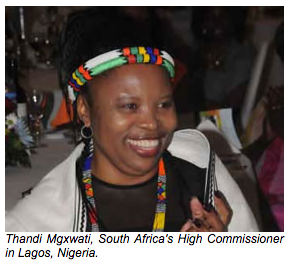
South Africa maintains diplomatic relations with countries and organisations through 124 missions in 107 countries throughout the world. This is hard work, done by representatives of our country who promote South Africa, its beauty, values and economic potential; and make our country's voice heard in the international arena.
What is an embassy?
An embassy is the larger and more important than a consulate and is described as a permanent diplomatic mission which is generally located in a country's capital city. The embassy is responsible for representing the home country abroad and handling major diplomatic issues, such as preserving the rights of citizens abroad.
What is an ambassador?
The ambassador is the highest official in the embassy acting as the chief diplomat and spokesperson for the home government. Ambassadors are typically appointed by the highest level of the home government.
What is a consulate?
A consulate is a smaller version of an embassy and is generally located in the larger tourist cities of a country but not the capital. Consulates (and their chief diplomat, the consul) handle minor diplomatic issues like issuing visas, aiding in trade relationships, and taking care of migrants, tourists, and expatriates.
Living and learning in Lagos
To find out first-hand what it is like to be a representative for South Africa in a foreign country, Vuk'uzenzele spoke to Thandi
Mgxwati, who heads the South African High Commission in Lagos, Nigeria.
What do you enjoy most about living in Lagos?
Although Lagos is the smallest state in Nigeria, it has the highest urban population, estimated at 27,4 per cent of the national population. Lagos is a socio-cultural melting pot, with about 18,5 million people living here. The city contributes more than 30 per cent of Nigeria's gross domestic product.
My favourite thing about living in Lagos is that one gets to experience what makes Nigeria tick in terms of culture, entrepreneurial activity and markets. In addition, Nigerian people, specifically those in Lagos, make you feel welcome in their city by their warmth and politeness. What fascinates me is that, despite the hardships ranging from irregular power supply to horrendous traffic congestions and communication network challenges, Nigerians always find a way of making it work.
What do you enjoy most about living in Lagos?
One major adjustment I had to grapple with was changing my mind-set and resisting the temptation of comparing the way things are here and at home. For instance, I had to get used to the fact that having electricity for about five hours in a day without power outage is a luxury here, so I had to get used to the overpowering noise of generators wherever I went. I also had to get used to the fact that meetings and functions can never start on time; they can easily start an hour or more late.
What do you like most about the Nigerian people, and what can we learn from them?
The most striking thing for me is that they are hard workers who try to make ends meet with their creativity and dedication. Informal traders range from tailors carrying sewing machines on their shoulders in the streets looking for customers; and people running mobile offices from the boots of their cars in street corners using small generators for services such as photocopying, printing, and laminating of documents; to street vendors who sell anything usable until the middle of the night.
The attitude is "Walala Wasala", which roughly translates to "If you snooze, you lose".
What are your duties at the South African Embassy?
My duties include strategic management and playing a leadership role. This involves building lasting relationships with the Lagos State Government as well as governments of the eight other Nigerian states, Ogun, Oyo, Osun, Ondo, Delta, Rivers and Bayelsa.
More importantly, Lagos is the economic hub of Nigeria and West Africa. It serves as a gateway for business, including a number of South African companies aiming to expand their business interests into Nigeria and West Africa. Therefore, it is my responsibility to assist our companies to identify business opportunities, study the economic environment in Nigeria and advise them accordingly. There are currently about 100 South African companies operating in Nigeria, with interest growing in this big potential market.
The Mission often gets requests to address forums such as the Nigeria-South Africa Chamber of Commerce, universities and civil society groups. It is my job to use these platforms to promote South Africa's interests and discuss the country's position on topical issues.
In a nutshell, my job is to contribute towards strengthening of bilateral relations between South Africa and Nigeria, and to promote South Africa in all her facets.
What do you miss most about South Africa?
Our open wide roads and weekend coffee sessions with my friends at the House of Coffees or Mugg & Bean. I also miss my favourite cheesecake and the big shopping malls that we have in South Africa.
-Samona Murugan
Leleti Khumalo stars as ambassador of hope for KZN youth
Leleti Khumalo stars as ambassador of hope for KZN youth sadminYouth matters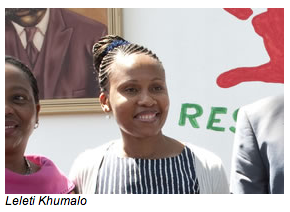
Popular South African actress Leleti Khumalo has joined forces with the KwaZulu-Natal government to help improve the standard of living for many youths.
The Durban-born star is the ambassador for the Leleti School Grounds project, which forms part of Operation Sukuma Sakhe – a provincial government initiative aimed at assisting communities to rise above their current circumstances.
Khumalo, who is known for her outstanding performances in Sarafina and Yesterday, will co-ordinate and host Uzogcwala La! - a magazine television show which will be filmed in townships around Durban and rural areas across the province.
Moving into top gear
Khumalo joined MEC for Finance Ina Cronjé at Eastwood Secondary School in Pietermaritzburg to interact with the local community, informing them of the purpose of the programme.
"We are here to listen to you. We brought you all the government departments to give you answers. But by the same token, we would also like to encourage young people to stand up and do things for themselves and come up with solutions so that the government can meet us halfway," said Khumalo.
"For too long, communities have been stuck in first gear. We are going to turn this skoro-skoro into a racing car. But we have to push together if we are to win the race against poverty, unemployment and the social ills of alcohol and drug abuse, teenage pregnancies an HIV and AIDS," said Cronjé, who is a champion of the uMgungundlovu District Municipality.
"Government is moving service delivery for young people in this area into top gear. I am happy to engage with learners, teachers and communities about the issues that lie close to their hearts. Our engagement does not end here, we will follow up on your issues."
Substance abuse
Learners at Eastwood Secondary School used the opportunity to talk about teenage pregnancy, substance abuse and financial assistance towards further education.
One learner, who did not want to be named, asked that government come up with a strategy to teach parents at home about substance abuse. The learner said although schools had programmes in place to educate them, they still had to go back home to parents with substance abuse problems.
To ensure government visibility at a household level, "each household will be profiled and the various departments and role players will assist the household members with their respective needs," Cronjé said.
-Kemantha Govender, BuaNews
Letters to the Editor
Letters to the Editor sadmin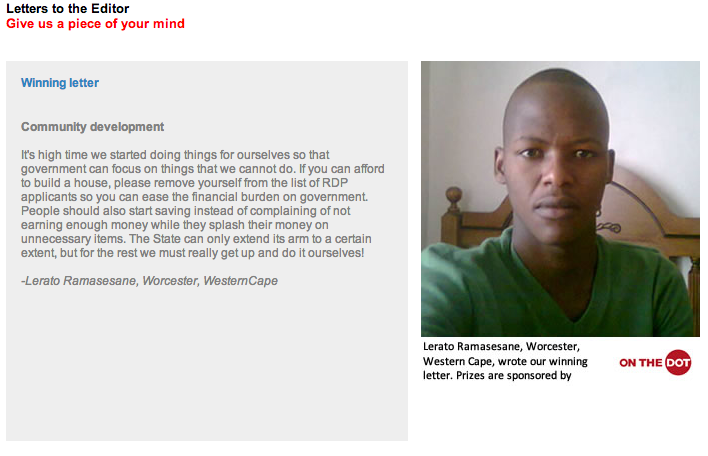
Respect people with disabilities
I am very disappointed with the way we as South Africans behave towards our sisters and brothers with disabilities. In my opinion we must not call them cripples nor should we call them disabled people. Although a person does have a particular disability, we must refer to him or her as a person with disability. When we refer to people with disabilities as "disabled people" we imply that they are unable to do anything, even though they may have only one disability and lead a full and active life.
It is our responsibility as a nation to show them the respect they deserve. Some of them are robbed of their pension money by their relatives or people known to them because they are vulnerable. Some of them are even raped or abused.
Let us stand up as nation and consider this as a matter that needs our special and urgent attention. if you suspect that a person with a disability may be mistreated, please notify the necessary organisation. By doing so, we will motivate our people with disabilities and show them that they are valued members of our loving South African nation.
–Sello Matlhaji, Hammanskraal, Gauteng
Anything is possible
We are living in a world that has opportunities and so much talent, and yet some people say they can't make it. But remember, the only thing that counts is how you look at yourself, how you set your mind in reaching your goals. Even if people tell you that you are not good enough, remember the more they talk bad about you, the harder you must try to become better at what you do best.
Don't sell yourself short, don't let negative people pull you down; in fact if you are surrounded by negative people, just cut them out of your lives and delete them from your social network. You will see that by being positive and believing in yourself anything is possible.
–Thabo Sempe, Excelsior, Free State

Marula beer bears economic fruits
Marula beer bears economic fruits sadmin
Employment news
Marula beer bears economic fruits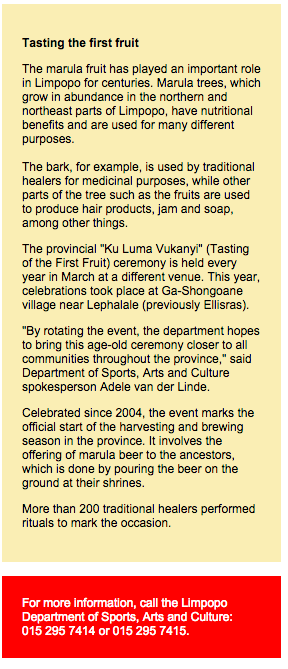
Hundreds of unemployed women in Limpopo have recently discovered that marula beer is more than just a traditional drink; they realised that it could also put money in their pockets.
During the past marula season, women in villages near Thohoyandou in Limpopo collected wild marula fruits and started making beer to sell to locals and people from as far as Gauteng.
Marula fruit ripens between January and March each year and collecting them to brew beer is an age-old tradition. However, women in the area only recently discovered that brewing marula beer could bear economic benefits.
Making money
The women from Shakadza, Muswodi, Tshiungani, Tshipise-Zwigodini and other villages outside Mutale near Thohoyandou have been making enough money to help them feed their families.
“We collected marula from the trees and started making the beer, which took three to four days to be consumed by drinkers. We learned how to produce marula beer from our elders who used it for traditional rituals only,” said Julia Mammbeda, one of the producers.
Fighting poverty
Mammbeda said in the past, women never saw the business opportunity in producing and selling the beer to the locals; they only made marula beer for recreational purposes and gave it away for free. Now it is helping them to fight poverty.
“Today we sell 20 litres of marula beer for as much as R100 and two litres for R10 and we make good money. This is better than being beggars because I can now smile all the way to the bank,” she said.
-BuaNews
More South Africans are and feel safer
More South Africans are and feel safer sadminGovernment priorities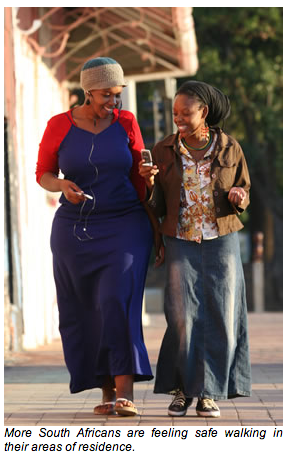
Victims of crime are beginning to see results in the fight against crime. According to the recently released results of the Victims of Crime Survey undertaken in 2011, there is a marked improvement in the treatment of victims.
“Among other things, the survey found that over 40 per cent of households felt that the level of both violent and non-violent crime had decreased in their area of residence during the period 2008 to 2010,” said Justice and Constitutional Development Minister Jeff Radebe.
Minister Radebe said of those surveyed, about 60 per cent of households were satisfied with the way police and courts were doing their work.
The survey also revealed that 32,1 per cent of households believed levels of crime had dropped, compared to 2007 when 57,1 per cent felt that crime had increased.
Regarding personal safety, 88,2 per cent felt safe when walking in their areas of residence during the day, while 27 per cent felt safe doing so at night. In 2007, the response was 76 per cent and 23 per cent respectively.
The Minister said similar victim surveys would continue annually under the auspices of Statistics South Africa to monitor perceptions of the public and victims of crime.
-BuaNews
More scientists and engineers in the making
More scientists and engineers in the making sadminYouth matters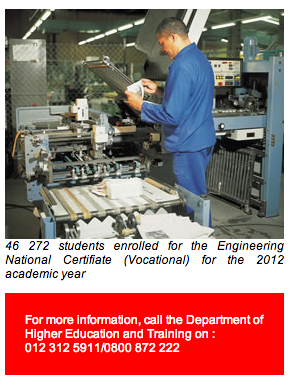
The number of first-year students taking up studies in sciences and engineering at universities is on the rise. This is good news for the economy as South Africa is experiencing a shortage of skilled people in these fields.
According to the Department of Higher Education and Training, a total of about 180 000 students are studying in these field this year. This up by 6,8 per cent from last year's projection of 175 072 students. In 2010, the enrolment was 168 408 students
Director General of Higher Education, Gwebinkundla Qonde noted a rise in the number of veterinarian first-year students, saying that a total of 184 students were expected to enrol this year. This is up by 145 per cent from last year's projection of 95 students. Plans are on the cards to take up more students in this area.
He said in 2010, 75 students enrolled for the programme, adding that universities had the capacity to meet the growing number vet students but more should be done to help them.
Veterinary studies
Oonde said they were negotiating with Tshwane University of Technology, the University of Pretoria and North West University to increase the number of students in veterinary science.
He said they were also in negotiations with the Department of Rural Development and Land Reform for the acquisition of a farm which would be used by the University of Pretoria and the University of South Africa, among others, for veterinary studies and research.
He emphasised the fact that most universities offering medical sciences were looking at increasing enrolments but lacked funds for such expansions.
FET colleges
Meanwhile, 270 000 students nationwide have enrolled at various Further Education Training (FET) colleges for the 2012 academic year, an increase of 60 per cent compared to 2011.
This year, these colleges opened up more space to absorb a further 17 145 students which had initially not been accommodated due to programmes being full.
FET colleges director Steven Mommen said 46 272 students had enrolled for the Engineering National Certificate (Vocational) and
38 116 had registered for N1-N3 engineering certificate.
He added that the demand for engineering studies had gone up by 70 per cent compared to last year.
National study loans change lives
National study loans change lives sadminEmployment news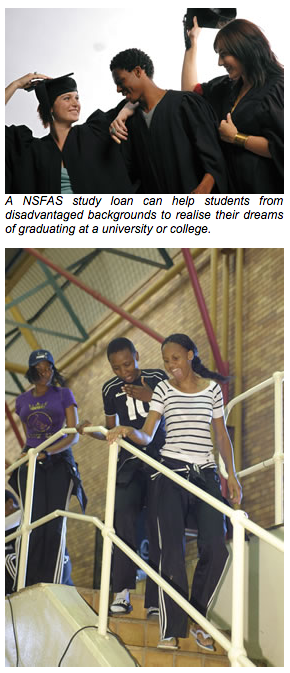
For many matriculants from disadvantaged backgrounds tertiary studies seem like an impossible dream. However, if you don't have the financial means to fund your own studies you can apply for a loan from the National Student Financial Aid Scheme (NSFAS).
NSFAS study loans are meant for students who cannot pay for their own studies and/or cannot access bank funding, other study loans or bursaries.
The four students highlighted below are among those who dared and won with NSFAS.
Maluta Nnditshedzeni (Eric)
Eric was born in a remote rural village called Mafukani, Limpopo Province and was the fifth born in a family of six siblings. His father was the only bread winner in the house and when Eric matriculated, it was hard for his father to fund his tertiary studies. My older siblings were all working to help my father pay our family bills.
Eric decided to speak to the NSFAS administrator at the University of Limpopo at the Turfloop campus and explained his situation. "I started using NSFAS from my first year in 1998 until my third year to complete my BSc Degree in Physics and Mathematics. In 2000, I graduated and then registered for a BSc Honours in Physics and received the NRF honours bursary. After finishing my honours in 2001, I joined the University of Venda (Physics Department) in 2002 to work as a Laboratory Technician. I started paying back the NSFAS loan and finished paying back the full amount in October 2008. The major advantage of the NSFAS loan is that if one is performing well academically only 60 per cent remains as a loan and the remaining 40 per cent is converted into a bursary. Hence one has to pay only 60 per cent of the loan each year provided all the registered courses are passed," he explained.
After completing his Master's degree, Eric applied for funding and obtained the Ford Foundation Fellowship to pursue his PhD. "It doesn't matter where you come from and I Thank NSFAS for the support without which I would not have come this far in my academic and professional career."
Mpho Mogobo
If you had met Mpho Mogobo in the 1980's there is a good chance that you would have found her barefoot and out in the fields herding cattle in rural Limpopo where she grew up. At any given time there would be up to 15 people in her tiny home in Seshego and as a result, young Mpho often went about her day on an empty stomach as food was a scarce commodity.
The grim reality of going to bed hungry and not having shoes to walk the distance to school each day only drove Mpho to strive for a better education. "I wanted more, and thus a family friend who was studying told me that I had to work harder than an average person to get where I wanted to be," she says. As a result, Mpho spent most nights studying by candlelight and many afternoons in the library so that she would achieve good results.
After matriculating in 1999, and with no money, Mpho heard about the National Student Financial Aid Scheme and qualified for a loan to pay for her studies in accounting. At 19, she became the first member of her family to graduate from university. But this in itself was still not enough.
Mpho persevered and in 2006 she started her articles. In 2008, she joined the Thuthuka Programme through SAICA (The South African Institution of Chartered Accountants) and completed both her QE1 and QE2 examinations, ranking in the top 10 of her class. What seemed impossible to some became a reality to Mpho, who is now a qualified chartered accountant. She is presently employed at Wesbank as a Financial Specialist.
Isaah Alexy Mhlanga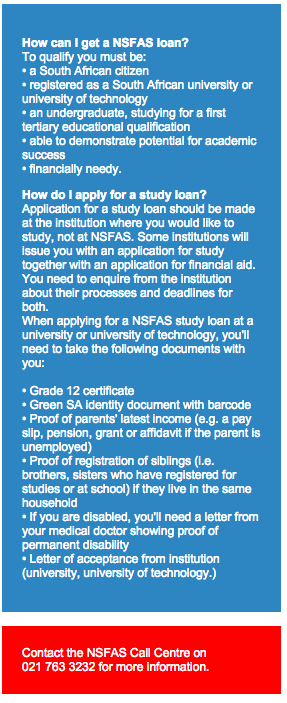
Isaah Alexy Mhlanga graduated with honours from the University of Johannesburg's Department of Economics and Econometrics. While studying, he came third in the Nedbank and Old Mutual Budget Speech competition and had an opportunity to meet former Finance Minister, Trevor Manuel. But it hasn't always been easy.
"I knew that my father couldn't afford university fees, so my matric results had to get me in," he explains. "My duty was to study hard. In the end, I matriculated with straight As." In his matric year, Isaah participated in Pro Maths in Dobsonville, a programme sponsored by Investec Bank's CSI department. His excellent results soon got the attention of the CSI head of Investec Bank, Setlongane Mancidi, who made it a point to offer Isaah a bursary.
The bursary he received was administered through one of the partner organisations of NSFAS, namely Study Trust. NSFAS was therefore further able to assist Isaah with his study-related costs to complete his undergraduate degree.
Today he is employed as an economist for the International Monetary Fund. I want to make people richer and myself wealthy in the process," he says. Isaah's advice to young people: "If you can't afford to study, that's not a train smash. Work like there is no tomorrow. Get those results - good results - and don't give up. Do your research and apply for bursaries or financial aid as early as you can. Be positive - if you have a brain and you use it wisely, you're bound to succeed."
Langelihle Nkosi
In 2005, Langelihle Nkosi stood on the verge of an exciting career when he graduated as Civil Engineering Technical from Mangosuthu University of Technology. Looking back, he continues to be grateful for the opportunity to study further and better his future, for himself and his family, who strugglingto make ends meet.
Since he didn't have money to pay for tertiary studies, he applied for funds from the National Student Financial Aid Scheme (NSFAS) and was successful - one less burden for his family to worry about.
Langelihle could now dream of making something out of life. His course in Engineering also gave him hands-on experience in the industry and while he was completing his studies he had the opportunity to work in the field for Umzinyathi Construction as well as Thekwini GeoCivil Engineers. He then joined public works in 2007 as Chief Works inspector in KwaZulu Natal and at the end of 2008 he ventured into the role of Project Manager for the Department of Works in Pietermaritzburg.
Today Langelihle owns a flat in Durban and drives his own car. He has realised that education can open up many doors and also encouraged his youngest sibling to apply for NSFAS funds for his studies. "And I say thank you to NSFAS for their help!"
-Samona Murugan
No more long walks to school
No more long walks to school sadminEmployment news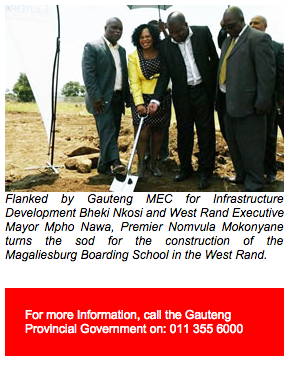
Days of young school children walking long distances to and from school will soon be a thing of the past for the secluded Ga-Mohale village residents in the West Rand. This follows the unveiling by Gauteng Premier Nomvula Mokonyane of a R120 million boarding school project in the farming community.
Accompanied by Gauteng MEC for Infrastructure Development Bheki Nkosi and West Rand Executive Mayor Mpho Nawa, Mokonyane said Gauteng Provincial Government was committed to ensuring the provision of quality education.
"Through this project, we aim to improve the quality of education, eradicate poverty and create job opportunities for our people," Mokonyane said.
Mama Action
Mama Action, as Mokonyane is affectionately called, said although the province was happy with the improvement in matric results, they remained concerned about the numbers.
She said they could not pretend as if everything was well when almost 20 per cent of their matriculants failed their senior certificate exams.
“That is why we are not taking the foot off the pedal, but instead working even harder than before to ensure that we produce learners who will be able to contribute significantly towards the economic development and growth of this province and the country.”
Stay, play and eat
Mokonyane said that the the odds were stacked against children who had to walk for about five kilometres or more to get to school in the morning on an empty stomach, walk back from school and still had no guarantee of a decent dinner before going to bed.
“The burden of these socio-economic challenges are too much to deal with. By investing in this project we are saying let these children have a better and world-class facility where they will stay, play and eat.”
Mokonyane also announced that a contractor had already been appointed to start work on the project and that the company was 100 per cent female owned. She urged the community to take ownership of the project and to be the eyes and ears of the government.
-Xoli Mngambi, Gauteng Provincial Government
Nursing opportunities for Gauteng job seekers
Nursing opportunities for Gauteng job seekers sadmin
Employment news
Nursing opportunities for Gauteng job seekers
The Gauteng Department of Labour, together with its counterpart in health, is offering hundreds of unemployed residents the opportunity to sign up for nursing courses.
The provincial Department of Labour has through its Public Employment Service Unit, teamed up with the Gauteng Department of Health and Social Development, to recruit applicants for nursing opportunities.
"The actual collaboration involving the two departments will see in excess of 800 out-of-work individuals signed up for a four-year nursing diploma course which will consist of theoretical and practical training in various hospitals in and around Gauteng. Successful candidates will receive a stipend while on training," the Gauteng Department of Labour said.
The minimum requirements for applicants are a Senior Certificate with a D symbol for higher grade English or a C for standard grade; alternatively a National Senior Certificate with four points in English and four other 20-credit subjects with at least three points (excluding Life Orientation and English).
If an applicant has successfully completed at least one year's post-Grade 12 education, the English symbols are not taken into consideration. The applicant then qualifies to progress to the second stage of the selection process and has to write an assessment. Applicants who are in Grade 12 this year are required to submit a Grade 11 report or their first term Grade 12 report to the Gauteng Department of Health.
Applicants employed by the department are exempted from English proficiency and score calculations. Prospective candidates have from 1 March to 30 April to submit their applications.
Candidates, who qualify according to their academic requirements, will be psychometrically assessed.
Those with the required results will then be referred to the Gauteng Department of Health for interviews - the final selection phase.
The application form, which can be obtained from any of the 26 labour centres in Gauteng, should be accompanied by certified copies of a senior certificate, first page of identity document, marriage certificate/divorce order/affidavit if customary married and proof of address.
Applications can be submitted, at no cost, to labour centres in Gauteng on Mondays, Tuesdays and Wednesdays until 30 April.
Presidential Hotline: Hotline still making a difference
Presidential Hotline: Hotline still making a difference sadminPresidential Hotline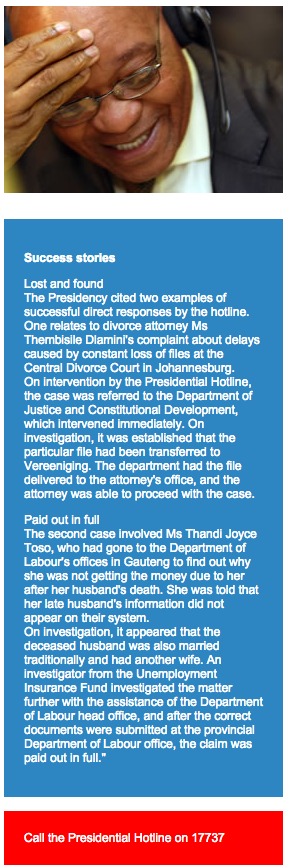
From recent statistics it is clear that the Presidential Hotline continues to make a difference to the lives of ordinary citizens, while making government more accessible.
According to the latest statistics, the hotline has an overall case resolution rate of almost 80 per cent, which is a significant milestone since its establishment in September 2009.
Since 31 January 2012, the hotline has logged a total number of 122 589 calls nationwide with the overall case resolution rate standing at 79,89 per cent. This is a major improvement since 2009, when the resolution rate was at 39 per cent.
Better coordination
According to the Presidency, most of the complaints are around housing, unemployment, social services, citizenship, water and electricity, law-related matters and education.
The majority of these calls are from KwaZulu-Natal, Gauteng and the Eastern Cape, which is attributed to the population size.
The Presidency attributed the success of the hotline to better coordination at the Directors-General and senior management levels of government. Also, responsiveness reports have been regularised on the agenda of the Forum of South African Directors-General and a periodic item on Cabinet's agenda.
"We are gradually making progress and living up to President Jacob Zuma's promise that citizens will have a platform to communicate with government and get the assistance they deserve," said Minister in the Presidency, Collins Chabane.
"As we have begun with our frontline service delivery monitoring, the hotline provides us with good data about which areas need immediate attention and we will respond."
More call centre agents
On average, it takes 67 working days to resolve a matter that has been recorded with the hotline. However, there are queries which get immediate response, such as requests for information on government services.
To ensure that the hotline operates optimally, the Presidency says it will increase the number of call agents from 20 to 30 as of June this year. This will see an increase to 15 agents per shift operating on two shifts a day.
The Department for Performance Monitoring and Evaluation was now using the hotline to inform its "unannounced Front Line Service Delivery Monitoring visits", the Presidency said, and had begun to engage with departments and municipalities that were often targeted by hotline complaints.
The Presidency said it was aware that there were still a number of citizens who were waiting for responses and that a lot still needed to be done to achieve a 100 per cent call resolution rate. But it was committed to ensuring that every citizen received a response.
-The Presidency
Relief for farm workers who reap a better wage
Relief for farm workers who reap a better wage sadminEmployment news
Many farm workers will find it easier to make ends meet this month thanks to the rise in their minimum wages that took effect in March. Labour Minister Mildred Oliphant announced the rise as part of legislation to protect vulnerable workers.
“In terms of sectoral determination for farm workers, the minimum wages will be adjusted upwards from 1 March 2012 to 28 February 2013 from an hourly rate of R7,04 to R7,71; a weekly rate of R317,51 to R347,10 and monthly minimum wages of R1 375,94 to R1 503,90, calculated on a 45 ordinary hour week,” said Page Boikanyo, spokesperson of the Department of Labour.
The minimum adjustment of rates for the successive periods of 1 March 2013 to 28 February 2014 will be the previous year’s minimum wage plus the consumer price index (CPI) + 1, 5 per cent, said Boikanyo.
The Minister set the wage increase on the advice of the Employment Conditions Commission following a long consultation process and public hearings. They took into consideration the views of various stakeholders.
Sectoral determination deals with the protection of workers in vulnerable sectors. The determination sets minimum working hours, minimum wages, number of leave days and termination rules. The latest adjustment follows that of the domestic sector, which was nudged upward in December 2011.
“The department wishes to inform employers who choose to ignore the farm workers’ sector determination, to do so at their own peril,” Boikanyo said.
“Our inspection and enforcement teams will be at hand to ensure that the law is implemented to the letter.”
-LIoyd Ramutloa, Department of Labour
Speedier justice for all
Speedier justice for all sadminGovernment priorities
Court cases dragging on for months will soon be a thing of the past, as efforts to speed up the finalisation rate start yielding results.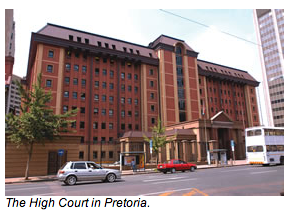
“The country-wide situation regarding the outstanding and backlog cases per court level has continued to improve,” said Justice and Constitutional Development Minister Jeff Radebe.
“Engagements are underway between the Chief Justice and the heads of court to ensure that norms and standards are used throughout the country in driving and improving performance in courts,” he said.
Reducing backlogs
“As at the end of December 2011, we had succeeded in reducing the backlog numbers to the lowest number of backlog cases 32 902 (15,9 per cent) in the past five years.”
For the period April to December 2011, 327 818 cases were finalised. The high courts had an average conviction rate of 84,4 per cent (752 cases); the regional courts 74,2 per cent (21 886 cases) and the district courts 90,5 per cent (185 884 cases).
To increase capacity in the courts, a total of 134 new prosecutors, who recently graduated from the Justice College, will be deployed throughout the country.
To further minimise delays in finalising court cases, the Office of the Chief Justice has initiated a process of case-flow management, as well as a process to set uniform norms and standards for the judiciary.
Getting the flow going
Additional measures now in place to assist with case-flow management include:
- a High Court Case-Flow Management Structure chaired by Judge President Mthiyane
- a Lower Court National Integrated Case-flow Management Committee led by the Regional Court
- provincial integrated case-flow management forums are also in place, with most of the forums led by either the Judge Presidents of the provinces or the Regional Court Presidents
- A case-flow management workshop with all lower-court stakeholders took place on 1 March to ensure interaction between regional and national case-flow management structures.
Partnerships
Meanwhile, Minister Radebe said the strengthening of partnerships within the Criminal Justice System would remain a priority this year. He said these partnerships would include communities, role players within government, business, interest groups, media, municipalities, religious and youth formations, as well as international law enforcement agencies.
“As part of improving service delivery, we are in the process of reviewing our 10111 operations to ensure the efficiency of the system. This may include the revised deployment of resources in order to make the system more effective,” he said.
In the meantime, high-tech equipment, vehicles and other tools procured during the 2010 FIFA World Cup continue to be used to safeguard all people within the country.
-BuaNews
Sports: Blade Runner scoops Laureus Award
Sports: Blade Runner scoops Laureus Award sadminSports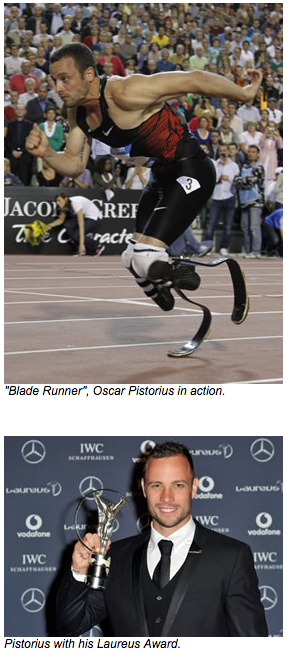
Oscar Pistorius made South Africans proud again recently when he scooped the 2012 Laureus Award for the World Sportsperson of the Year with a Disability.
The awards honour sporting personalities and teams for their performances in the previous year. The winners are determined by the Laureus World Sports Academy.
What a kick-off!
Pistorius, also referred to as the ‘Blade Runner’, is a double amputee and runs on specially designed carbon fibre blades. Now 25, he was born with a congenital absence of the fibula and his legs were amputated below the knee when he was 11 months old.
He received a Laureus Award for becoming the first amputee to win a track medal in the non-disabled World Championships – a silver in the 4 x 400-m relay in South Korea. Aided by his carbon fibre blades, Pistorius went on to become a Paralympics gold medalist in 2008.
Congratulating Oscar Pistorius on his achievement, South Africa’s Olympic governing body President, Gideon Sam said, “What a kick-off to our Olympic and Paralympic campaign! There’s no doubt Oscar will be one of the key weapons in our battle to win even more medals at the Paralympics. He is not only a Paralympics legend already, not only a fine ambassador for South Africa, but also a role model for both athletes with disabilities and able-bodied athletes.”
Such a privilege
Pistorius received the Laureus statuette from Spanish actress Elsa Pataky and skateboard legend Tony Hawk during the globally televised awards ceremony in London. “It’s such a great privilege ... it is really humbling to be here. To all the Laureus Academy members, all you guys, thank you very much,” an elated Pistorius said.
He ran a personal best 400-m time of 45,07 seconds in Italy last year to qualify for the world championships and is now bidding to be part of Team South Africa at this year’s 2012 Olympic Games in London.
South Africa’s Olympic governing body chief executive officer, Tubby Reddy, also congratulaed Pistorius. “Oscar is a remarkable young athlete. The impact that he has had on uplifting the image of sportsmen and women with disabilities is enormous. Coming as it does in an Olympic and Paralympic year, this honour is a huge boost for South African sport.”
Other winners
Laureus World Sportsman of the Year went to tennis player Novak Djokovic, who has won three Grand Slam events, the Australian Open, Wimbledon and the US Open.
The Laureus Sportswoman of the Year Award went to Kenya’s long-distance runner Vivian Cheruiyot, who won gold medals in both the 5 000-m and 10 000-m events at the World Championships in Daegu.
The Laureus World Team of the Year went to FC Barcelona, a favourite among football fans in South Africa. The Spanish team continues to dominate European football and the domestic league.
The Laureus World Breakthrough of the Year went to youngster Rory McIlroy, who won the US Open, his first major championship.
Laureus World Action Sportsperson of the Year was presented to Kelly Slater. This was Slater’s fourth Laureus Award, equalling the record of Roger Federer, the only other four-time winner.
England’s football legend Bobby Charlton received a Laureus Lifetime Achievement Award, while Rai Souza Vieira de Oliveira, the former Brazilian footballer, now social justice campaigner, won the Laureus Sport for Good Award.
-Kemantha Govender, BuaNews
Sports: Young Soweto cyclist heads for glory
Sports: Young Soweto cyclist heads for glory sadminSports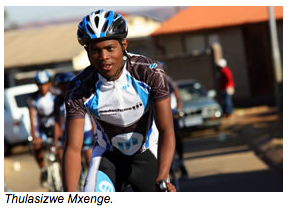
Cycling is not popular as a competitive sport among township children. However, one boy hopes to change this after being selected to be part of the South African National Junior Track Squad participating in the Junior World Track Championships. The competition is taking place in Invercargill, New Zealand in August this year.
A grade 12 learner from Senaoane Secondary School in Soweto, Thulasizwe Mxenge, 18, says he wants to see more children of all races participating in the sport. "This kind of sport is not popular in the township and considered to be a white people's sport. I am proud to be one of the people to debunk this myth."
Love for cycling
"I used to see a guy here in the township cycling, that was when my love for cycling started and I told myself that I would do it one day. In 2009, a friend took me to join Medscheme Development Team," he says.
"We practise every day except for Mondays as it is our day to relax. It is going to be difficult this year, since I am in matric an have to make time for my studies," Mxenge said.
Mxenge and four other talented youngsters from Gauteng are part of the team of 19 cyclists from all provinces that will be taking part in the Track Training Camps during the course of 2012 en route the Junior World Track Championships in New Zealand.
Track training camps
Another cyclist, Jac Steyn (17) says that he was attracted to mountain biking at first but got into cycling three years ago.
He shares the same concern as Mxenge about going on camps and missing out on some of his school work as he, too, is in Grade 12. "Cycling is great fun and develops one, but my school work is important to me. It is difficult to try and catch-up on the school work you missed out on," he said.
CyclingSA has held a highly successful Track Training Camp in December 2011 in Cape Town where the team was selected. The identified team is divided into three groups; Male Endurance, Female Endurance and Male Sprint. Both Mxenge and Steyn are looking forward to going to the camps and are honoured to have been selected in the team. According to CyclingSA, a new talent identification squad for 2013 will be chosen at an open training camp, which will once again be held in December.
-Thembisa Shologu
State of the Province: Sketching the state of the provinces
State of the Province: Sketching the state of the provinces sadminGovernment priorities
President Jacob Zuma's State of the Nation Address (SoNA) highlighted infrastructure development, which will enhance economic growth and job creation in the nine provinces.
A glance at the SoNA and the spending pattern among the nine provinces, clearly indicates that provincial growth and development strategies are aligned with the President’s vision, particularly in the priority areas of job creation, education, rural development and health.
Vuk’uzenzele unpacks some of the highlights of the provinces’ State of the Province Addresses and their alignment with the SoNA.
North West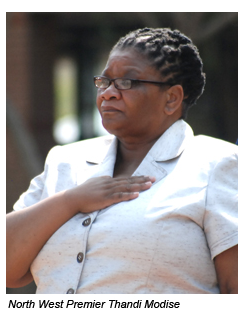
Premier Thandi Modise highlighted education and recreation as priorities, saying the North West government would be building libraries and recreational centres at Lomanyaneng, Mahikeng, 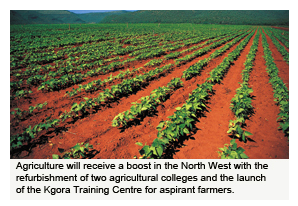 Manthe, Moretele, Lichtenburg and Schweizer-Reneke.
Manthe, Moretele, Lichtenburg and Schweizer-Reneke.
She said the Taung and Potchefstroom agricultural colleges were being refurbished and the provincial government would be launching the Kgora Training Centre to afford emerging and aspirant farmers practical farming experience.
Regarding the planning of roads, the provincial government has approached the South African National Roads Agency for assistance with improving the roads infrastructure.
Electricity infrastructure received a boost with an Eskom investment of R10,85 billion over the next five years. During the current financial year, a total of 10 162 new electricity connections will be made.
Premier Modise noted that the province had exceeded its own job-creation target of 52 898 jobs by creating 80 433 jobs.
In addition, the rehabilitation of the Vaalharts water scheme would create jobs and boost economic growth. This would not only benefit the North West province, but also the Northern Cape, she added.
Limpopo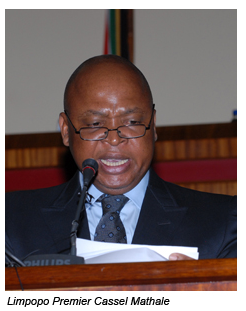
Premier Cassel Mathale said infrastructure expansion had been identified as one of the key pillars for improving living conditions in Limpopo, while also creating jobs.
The provincial government aimed to create 124 626 jobs by the end of the third quarter of the current financial year, he said Infrastructure development programmes include schools and the revitalisation of hospitals and clinics. Mathale noted that 32 schools and 2 431 classrooms had been built. Seven new clinics had also been built and 32 upgraded and the Siloam Hospital would be revitalised.
He said the province had signed a memorandum of understanding with Transnet Freight Rail to create logistics hubs to bring together transport infrastructure for agriculture, mining products and other commodities that had to be railed to other parts of the country and abroad. Logistics hubs, which will reduce the number of heavy goods on the roads, will be created in Polokwane, Musina, Burgersfort and Lephalale.
The Lephalale corridor and the plan to develop and integrate rail, road and water infrastructure, centred on Lephalale and Steelpoort will attract more investment. In the north, the Musina to Africa Strategic Supplier Hub Initiative (MUTASSHI) will promote north to south trade relations.
Gauteng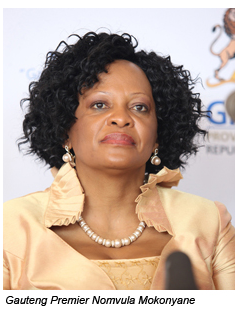
Premier Nomvula Mokonyane said the Gauteng provincial government was committed to accelerating the implementation of mega projects to drive growth and development. The projects formed an essential part of the Integrated Infrastructure Development Programme to promote job creation.
More than R500 million would be spent on the construction and maintenance of roads. This would include major rehabilitation of the N14 and the R25, Mokonyane said.
"We will also upgrade the R82 (the old Vereeniging Road) linking Johannesburg and Sedibeng, as well as William Nicol Drive. The construction of the K154 will be undertaken, stimulating development in the rural parts of south Sedibeng."
As part of rural development, roads in five rural development nodes would be upgraded, Mokonyane noted. "Through the S'hambaSonke road maintenance project, we will capacitate 100 new contractors and create 6 500 jobs."
On the information, communication and technology front, Premier Mokonyane said the province had embarked on efforts to build the knowledge economy as a driver of development. This will be done through the G-link Project, which aims to achieve 95 per cent broadband coverage in the province, roll out e-government services and grow the economy.
The provincial government is also planning a climate innovation centre and a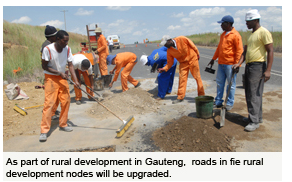 bio-science park at the Innovation Hub in Pretoria to help entrepreneurs
bio-science park at the Innovation Hub in Pretoria to help entrepreneurs
to develop green technologies.
On job creation, Mokonyane said that by the end of December 2011, the provincial government had exceeded its job creation targets, creating 281 686
jobs against a target of 229 904 by the end of March 2012. Of these, 5 629 were permanent jobs, 40 898 were temporary and 235 159 were jobs created through the Expanded Public Works Programme.
Regarding human settlements, progress had been made with implementing of 14 mixed housing developments, while 69 informal settlements had been formalised.
Free State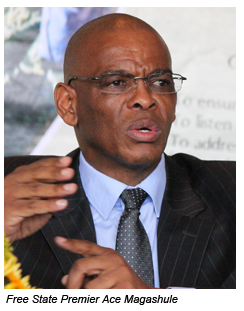
Free StatePremier Ace Magashule said a partnership between the Free State Development Corporation, the Mangaung Metro and the provincial Department of Human Settlements would facilitate the building of 3 000 housing units for people who earn above
R3 500, but who do not qualify for housing loans from banks.
A similar partnership was entered into with the Moqhaka Local Municipality to construct 2 000 mixed housing development units at Viljoenskroon and Kroonstad.
Various initiatives, including a dairy project in Vrede would see the creation of 33 954 job opportunities. In addition, the provincial government had drawn up a database of unemployed graduates for placement in internships, the Premier said.
Regarding infrastructure development, the Harrismith Logistics Hub, now part of the Durban-Free State-Gauteng corridor, will promote and stimulate economic growth in the Free State.
This includes a containerised manganese project in Bloemfontein in a partnership between the Free State Development Corporation and Transnet. It will link the mines of the Northern Cape, containerising the manganese cargo in Bloemfontein and transporting it by rail to Durban for export.
The provincial government has strengthened its relationship with Eskom to promote service delivery. Last year, Eskom completed 6 559 connections and is targeting an additional 1 454 this year. An additional six compact fluorescent light (CFL) roll-out projects and 11 energy efficiency projects were implemented at a cost of R128 million. This is in addition to the 2,1 million CFLs, 14 684 solar water geysers and 24 897 ripple control units that have been delivered since 2007.
Eastern Cape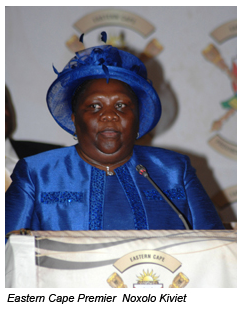
The Eastern Cape's East London industrial development zone (IDZ) has secured private investors to the value of R4 billion. Of this, R3,3 billion had been set aside for renewable energy projects, Premier Noxolo Kiviet said.
The Coega IDZ has 21 operating investors and has created 3 645 construction jobs, and 2 985 direct jobs. In addition, the Coega IDZ is implementing projects to the value of R7,6 billion. The R1 billion First Automobile Works automotive investment will create 2 000 direct jobs.
The Eastern Cape government supports co-operatives through the Imvaba Fund, with 46 cooperatives established and 16 new entrants supported so far.
Of the targeted 94 504 jobs announced for Phase 2 of the Expanded Public Works Programme (EPWP), 110 472 have been created. Similarly, 2 622 EPWP beneficiaries throughout the province were trained in technical and life skills. "Our target is to create 116 958 jobs in the current financial year", Premier Kiviet said.
The upgrading of the N2 Wild Coast, at a cost of approximately R9 billion, had been approved and construction would start soon. This project would create some 6 800 direct jobs and open up the Wild Coast for investment, the premier noted.
Regarding housing, 8 303 houses had been completed while a further 7 870 are being constructed. In addition, 2 397 units have been repaired.
Western Cape 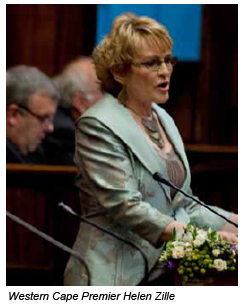
Premier Helen Zille said the provincial government had established an Economic Development Partnership (EDP) to develop a shared agenda for economic growth, development and inclusion. The EDP would focus on developing a shared economic vision, strategy and brand for the province.
In addition, the Western Cape has compiled an infrastructure agenda that includes regeneration projects in conjunction with the City of Cape Town and the private sector, the building and upgrading of roads including a divisional road between Gansbaai and Bredasdorp and the Wingfield interchange bridges and a roads network improvement project in support of the Saldanha Industrial Development Zone initiative.
The Premier announced a massive new investment in education infrastructure. "We have increased our schools maintenance budget by 46 per cent in the last two years," she said.
Plans for the next two years include building eight new schools and replacing 23 current school buildings. There are also plans to build 768 new classrooms and replace 583 current classrooms by the end of next year. By the end of the 2011/2012 financial year, 11 new schools and five replacement schools, as well as 570 classrooms will have been completed.
A public-private partnership has been established to bring broadband access to every school in the province.
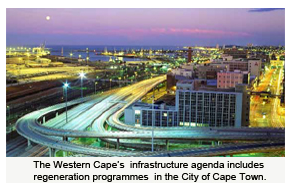
KwaZulu-Natal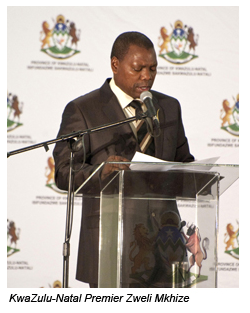
Premier Zweli Mkhize said the provincial planning commission had worked very hard to ensure that the Provincial Growth and Development Strategy and Plan were fully aligned with the National Development Plan.
Last year, the province obtained an allocation of R11 billion, which has since been raised to R15 billion for schools infrastructure, roads and water, as well as the upgrading of ports and the rail transport strategy.
The Department of Water Affairs has started a massive water supply programme to increase bulk water supply and establish more water treatment plants and storage facilities in the province. Around R18 billion has been allocated to raise the wall of the Hazelmere Dam, complete the construction of Spring Grove Dam in Mooi River, Umgungundlovu to augment the Umngeni River catchment.
Other major water projects include Ngagane water treatment works and transfer, Jozini-Ingwavuma bulk water supply, Mandlakazi water scheme, Msinga and Vant's Drift bulk and Mhlabashane Dam. Water supply and sanitation projects are also in the pipeline for Amajuba and Umkhanyakude districts.
Northern Cape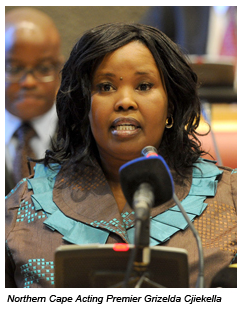
In a quest to improve the quality of teaching and learning, Northern CapeActing Premier Grizelda Cjiekella said the provincial government has, in collaboration with the Sishen Iron Ore Community Development Trust and Rhodes University, entered into a four-year capacity-building programme for teachers.
Some 108 teachers would study towards bachelor of education degrees in the foundation phase, mathematics and languages. The province would also soon have its own university as announced during President Jacob Zuma's State of the Nation Address, the Premier noted.
She said from the first to the second quarter of 2011, 3 000 jobs had been created in the Northern Cape. Various projects had also been identified to drive job creation. They included a rooibos tea processing and packaging project, revitalisation of Warrenton Superchicken and the Vaalharts irrigation scheme, upgrading of the Heuningvlei bulk water infrastructure, a hydroponics packing facility at Tshwaraganang hydroponics, the Blocuso irrigation development and the Riemvasmaak irrigation development.
For 2012/2013, R336 million has been set aside to develop human settlements, which will go a long way towards addressing the housing backlog. A total of 2 515 houses will be built through different projects.
Mpumalanga 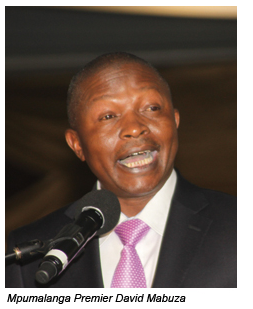
Premier David Mabuza said the provincial government concluded the crafting andadoption of the Mpumalanga Economic Growth and Development Path, which would guide the province in terms of job creation, economic growth and development.
From April 2009 to date, the province had created 135 793 jobs through the Expanded Public Works Programme. The province had also established more than 13 000 job opportunities through the Comprehensive Rural Development Programme the beneficiaries being predominantly youth and women, he noted.
As announced by President Jacob Zuma in his State of the Nation Address, the province will soon have its own university into which a tertiary training hospital will be incorporated.
As part of enhancing comprehensive support to poor learners, the no-fee school policy has been rolled out in 1 604 schools. In addition, 832 254 learners in primary and secondary schools are benefiting from the school nutrition programme.
The province will continue to enhance its Artisan Skills Training Programme benefiting at least 90 learners in line with the Comprehensive Rural Development Programme.
In partnership with the Department of Higher Education and Training, the province intends to create and strengthen system-wide partnerships with training institutions to help graduates obtain workplace training. The province will allocate 200 bursaries in scarce and critical skills.
The Mpumalanga Regional Training Trust has trained more than 600 young people in construction-related trades linked to the implementation of the Peoples Housing Programme. Almost 2 000 houses have been completed and further 2 547 are being built.
The Marapyane Agricultural College has been officially opened with 120 students enrolled and 20 lecturers already appointed.
The state of provincial healthcare
The state of provincial healthcare sadmin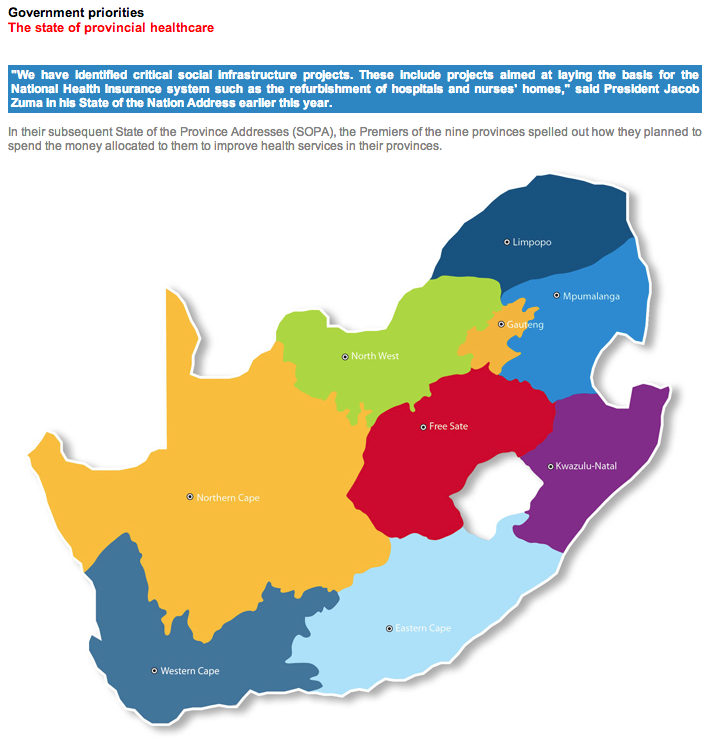
Northern Cape
Students in various categories of healthcare are currently serving their contractual obligations towards the Northern Cape Department of Health. They comprise 11 dental assistants, 23 basic ambulance assistants and 11 graduates on the Cuban Programme who have completed their studies as medical practitioners. A further 12 students have been accepted into the Cuban Programme and have started with their studies. In total, 64 students are studying towards their medical degrees at various institutions.
To supplement the much-depleted nursing corps, 154 students are studying towards the four-year Comprehensive Training Degree. In addition, the Mapoteng, Riemvasmaak, Boichoko and Grootmier Clinics have been completed, the West End Hospital State Patients Unit has been upgraded, the De Aar and Upington hospitals are being built and the new Kimberley Hospital is in the design phase. Additional clinics are being built at Deurham and Ka-Gung and a clinic is planned for Heuningsvlei.
... for more info call: 018 387 5778
Western Cape
The construction of Khayelitsha District Hospital has been completed and will be officially opened on 17 April, said Premier Helen Zille. The first patients have already been transferred to the new facility and the 24-hour emergency centre, as well as the obstetrics and paediatrics wards are fully operational. The construction of Mitchell's Plain District Hospital is also on track and will be fully commissioned by March 2013, the Premier added.
A number of district hospitals and clinics have also been renovated and upgraded. These include ARV treatment facilities at the Crossroads, Gugulethu and Retreat clinics, as well as repairs to district hospitals in Beaufort West, Vredendal and Riversdale.
The Valkenberg Hospital is earmarked for a R1 billion revamp, which will include 17 buildings to be added to the complex and an increase in the bed capacity from 92 to 432. This will contribute towards better care for psychiatric patients and drastically reduce the waiting lists of awaiting trial prisoners who need psychiatric observation. The project will be completed by July 2016.
... for more info call: 021 483 5624
Free State
On the provision of primary health care, Free State Premier Ace Magashule said the Provincial Health Department would continue to improve primary healthcare in all districts and municipalities.
Special attention would be given to better access to primary healthcare services, especially through outreach programmes to households and communities, he addedd. This will include the employment of 600 fully trained community health workers into family health teams in 47 wards within the province. In addition, community health centres would be established at Pelonomi Hospital in Bloemfontein, as well as in Zastron, Sasolburg and QwaQwa, he said.
"The maintenance of health facilities in the province will continue to receive priority attention," the Premier added. The province plans to build new hospitals in Bloemfontein, Amelia in Sasolburg and in the rural areas of Qwaqwa and Botshabelo. The Qwaqwa area in the eastern part of the province has been selected as one of the pilot sites for the National Health Insurance (NHI).
... for more info call: 0800 535 554
North West
Premier Thandi Modise said work was progressing on the new Bophelong Psychiatric Hospital and the hospital building project is expected to be completed this year. In addition, the Provincial Government will use the hospital revitalisation grant to upgrade Lichtenburg Hospital and its nursing college, as well as staff accommodation for the Brits Hospital. The revitalisation grant will also be used to refurbish the Moses Kotane, Potchefstroom and Taung Nursing Colleges.
Extensions of facilities will also be completed at Mmabatho and Excelsius nursing colleges. In addition, the revitalisation grant will be used to renovate Buxton, Tweelingspan and Moshana clinics and to build four community health centres at Sikhing, Maquassi Hills, Mathibestada and Joubertina.
Eastern Cape
The Eastern Cape Department of Health is continuing to work intensively on its multi-year turnaround programme. The province has been allocated R15,1 billion to help the department prepare for its National Health Insurance (NHI) readiness programme and to retain much-needed skilled doctors and health professionals.
MEC for Provincial Planning and Finance, Phumulo Masualle, who presented the provincial budget of R56,2 billion, said the province was making steady progress in its readiness for the NHI.
The budget will also be used to complete the Cecilia Makhiwane Phase 3 project, which is the provision of a training college and accommodation for nurses. A new tertiary hospital complex will also be built, while health infrastructure and equipment will be upgraded and maintained.
The province is also making steady progress with the treatment and prevention of HIV and AIDS and TB with the rate of new infections stabilising.
... for more info call: 0800 032 364
Limpopo
The Limpopo Provincial Government has been hard at work intensifying the fight against HIV and AIDS by increasing the number of healthcare centres and offering comprehensive HIV and AIDS treatment. "In 2009, we had only 80 healthcare centres with necessary facilities to offer comprehensive HIV and AIDS treatment; now we have 483 centres accredited to offer the treatment to our people and we are determined to increase this number," said Premier Cassell Mathale.
"We will also continue devoting special attention to diseases such as diabetes, tuberculosis, malaria and others. These diseases are affecting many of our people and we have a responsibility to reduce and curb them."
Siloam Hospital will also be revitalised at a cost of R250 million through the Presidential Infrastructure Coordinating Commission.
... for more info call: 0800 919 9191
Mpumalanga
In preparation for the National Health Insurance (NHI), seven community health centres and clinics will be built and existing facilities upgraded. Premier David Mabuza said all health facilities in the province are implementing quality improvement plans in line with the core standards for NHI compliance.
Qualified professionals will be appointed to manage health facilities, while training of nurses, pharmacists and allied health professionals will be accelerated. An efficient and effective system for drug supply management and distribution will also be introduced.
Other measures will include improving access to healthcare centres, conducting 50 000 male medical circumcisions, expanding the HIV Counselling and Testing Programme and improving the tuberculosis cure rate.
In addition, the Bethal, Carolina, Matibidi, Sabi and Mmamentlake hospitals in Dr JS Moroka Local Municipality will be upgraded. Community health centres and clinics will be built at Tweefontein, Phosa Village, Sinqobile, Mbhejeka, Pankop, Wakkerstroom and Siyathemba.
... for more info call: 0800 204 098
Gauteng
As part of the Gauteng Department of Health's new comprehensive turnaround strategy to improve the delivery of public health services, measures will be put into place to prevent a recurrence of the financial difficulties within the province's Health Department.
Gauteng Premier Nomvula Mokonyane announced some changes to the composition of her government by appointing a separate MEC for the provincial Department of Health.
In addition, more than 200 community service doctors will be deployed in district health services and regional hospitals to benefit the province's poorest communities.
In line with the turnaround strategy, the construction of the Zola/Jabulani Hospital and the Natalspruit Hospital should be completed by October this year.
To eliminate wastage, the department introduced an electronic gate-keeping system to manage tests that are ordered from the National Health Laboratory Services. Mekgwe said since the start of the pilot late last year at Chris Hani Baragwanath Academic Hospital, the hospital has saved R40 000 a month in unnecessary tests.
... for more info call: 0800 203 886
KwaZulu-Natala
Part of this year's provincial budget of R15 billion, will go towards improving health infrastructure. Among the projects earmarked are construction and extension of health facilities in Estcourt, Madadeni Psychiatric Hospital and Empangeni group of hospitals, as well as the design of John Dube Hospital and several clinics. Work has already started on the construction of King Edward VIII Hospital and the Addington Hospital.
Premier Zweli Mkhize said the province was also making steady progress in the battle against HIV and AIDS. To this end, the prevalence of HIV among women has dropped and is stabilising, more than two million people have undergone voluntary counselling and testing and medical circumcision has exceeded 105 500.
"The achievements are as a result of added value created by the multiple stakeholder participation in the Provincial Councils on AIDS that directs all sectors," the premier said.
... for more info call: 033 395 2009
Trade port a major boost for economic growth
Trade port a major boost for economic growth sadminEmployment news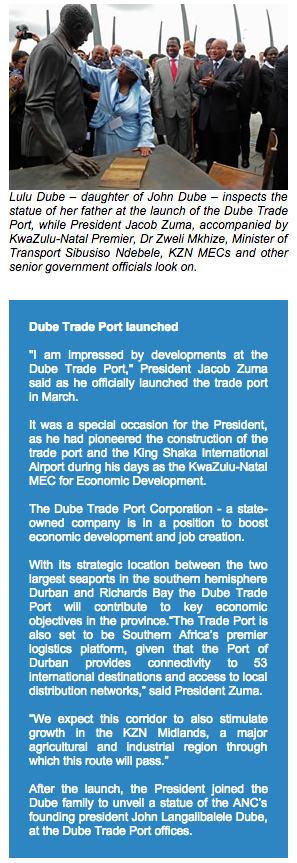
The Dube Trade Port is set to be a major logistics platform for Southern Africa, as the Port of Durban provides connectivity to 53 international destinations and access to local distribution networks, said President Jacob Zuma.
The President launched the state-of-the-art, multi-billion rand cargo terminal, trade zone, agriculture zone and IT and telecommunications platform at La Mercy, KwaZulu-Natal.
Located between the two largest seaports in the southern hemisphere Durban and Richards Bay – the Dube Trade Port has huge potential to boost economic growth and job creation in the province and the country.
The port, in which the King Shaka International Airport is located, has been operational for 22 months and the first phase has been completed. In the long term, the plan is to establish an “aerotropolis” to the north of Durban, stretching from Umhlanga to Ballito.
Job creation
KwaZulu-Natal premier Zweli Mkhize, also speaking at the launch, said the Dube Trade Port would greatly expand the province’s import and export capacity.
In 2003, a decision was made to relocate the old Durban International Airport to La Mercy and to establish the Dube Trade Port, incorporating the new King Shaka International Airport.
Passenger traffic at the new airport, which was completed in 2010 ahead of the FIFA World Cup, has been steadily growing since then.
“It is anticipated that the airport’s passenger traffic for the 2012 financial year will exceed the five million mark,” Zuma noted.
Gateway to Africa
President Zuma welcomed the decision of airline SA Express to make Durban its base for expanding into the southern African region. This is in line with government’s African agenda of promoting trade and economic growth on the continent by opening up new routes or expanding existing ones on the continent.
SA Express has concluded an agreement with the Dube Trade Port Corporation, which will see a connection being established between King Shaka International and the region, especially to Zimbabwe, Zambia, Botswana and Mozambique.
There are also plans for SA Express to expand into other African countries including Namibia, Malawi, Angola and the Democratic Republic of Congo.
“There can only be positive results from this strategic move,” President Zuma said. “Three regions alone – SADC, the East African Community and the Common Market of Eastern and Southern Africa – bring together about 600-million people. Added to this, Africa provides a market of one-billion people. The focus on our continent is therefore a step in the right direction in terms of the country’s strategic goals.”
Infrastructure pipeline
The Dube Trade Port will also form an important part of government’s new pipeline of major infrastructure development projects. One of them is the improvement of the movement of goods and economic integration through a Durban-Free State-Gauteng logistics and industrial corridor.
“This project is intended to connect the major economic centres of Gauteng and Durban/Pinetown. At the same time, it will link these centres with an improved export capacity through our sea ports and improved railway lines,” the President said.
“We expect this corridor to also stimulate growth in the KwaZulu-Natal Midlands, a major agricultural and industrial region through which the route will pass.”
-Francis Hweshe, BuaNews
We, the people of South Africa
We, the people of South Africa sadminAdvice and Events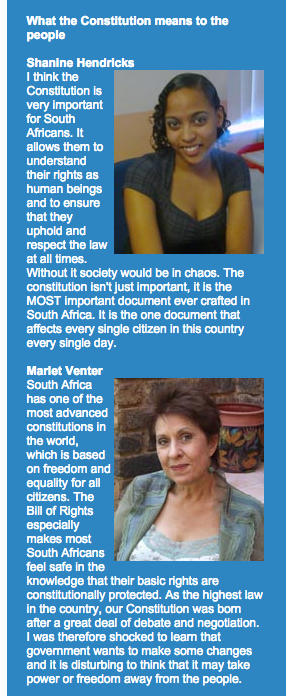
The theme for this year's Freedom Day is "Joining hands to celebrate 100 years of struggle for human rights and constitutional democracy". As such, the spotlight falls on South Africa's Constitution, which exemplifies human rights, democracy and freedom.
The theme for this year's Freedom Day is "Joining hands to celebrate 100 years of struggle for human rights and constitutional democracy". As such, the spotlight falls on South Africa's Constitution, which exemplifies human rights, democracy and freedom.
"We, the people of South Africa, recognise the injustices of our past; honour those who suffered for justice and freedom in our land; respect those who have worked to build and develop our country; and believe that South Africa belongs to all who live in it, united in our diversity."
These words from the preamble of South Africa's Constitution, refer to the fundamental human rights included in the Constitution.
South Africa's Constitution is widely recognised as one of the most progressive in the world. Human rights occupy pride of place in the Constitution with the Bill of Rights having attracted interest worldwide.
Contained in Chapter 2, the Bill of Rights is the part of the Constitution that has had the greatest influence on South Africans. The first words of the chapter introduce the Bill of Rights as a "cornerstone of democracy" that enshrines the rights of all South Africans."
Among other things, it protects our freedom and our dignity; it promotes equality, tolerance, responsible behaviour and respect for human life and supports all the other values in the Constitution.
SA first
Among the rights included in the Bill of Rights are the right to life, equality, human dignity, freedom of expression, freedom of religion, freedom of association, political rights and the right to peaceful assembly and demonstration.
These are the "first generation" rights, which are guaranteed in most democratic countries.
However, a distinctive feature of our right to equality is that it includes a prohibition against unfair discrimination based on sexual orientation. South Africa is the first country in the world to insert such a clause in its Constitution.
Our Bill of Rights also contains socio-economic rights, or "second generation" rights. These place a duty on government to work to provide education, health services, water and housing.
The last group of rights in the Bill of Rights, the "third generation" rights, has also attracted admiration for our Constitution. They include the right to having the environment protected, the right of access to information and the right to just administrative action.
The rights conferred by the Constitution have been the basis of a number of ground-breaking court cases. Examples include cases involving the rights for women, children, workers and gays and lesbians.
Supporting democracy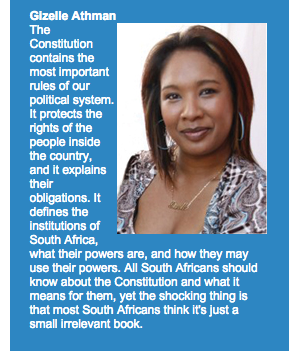
Another significant feature of our Constitution is that it has set up several independent bodies to support and safeguard democracy.
These are the:
- Auditor-General
- Commission for the Promotion and Protection of the Rights of Cultural, Religious and Linguistic Communities
- Commission on Gender Equality
- Human Rights Commission
- Independent Electoral Commission
- Public Protector
Collective wisdom
South Africa's Constitution was signed into law on 10 December 1996, and took effect on 4 February 1997. It is the supreme law of the land and no other law or government action can supersede the provisions of the Constitution.
The Constitution represents the collective wisdom of the South African people, as it has been arrived at by general agreement.
The process of drafting the Constitution involved many South Africans in the largest public participation programme ever carried out in South Africa.
After nearly two years of intensive consultations, political parties represented in the Constitutional Assembly negotiated the formulations contained in this text. It represents an integration of ideas from ordinary citizens, civil society and political parties from inside, as well as outside the Constitutional Assembly.
-Louise van Niekerk
Win-win approach for heritage sites
Win-win approach for heritage sites sadmin
Sports
Win-win approach for heritage sites
In a gesture towards nation-building and reconciliation, government is to declare the Voortrekker Monument in Pretoria a national heritage site, while unveiling a series of monuments to celebrate the heroes and heroines of the country's struggle for liberation.
The move follows the opening of an access road between two previously divided South African institutions - Freedom Park and the Voortrekker Monument - on National Reconciliation Day, 16 December, last year.
Following an announcement by Home Affairs Minister Nkosazana Dlamini-Zuma, the Voortrekker Monument - inaugurated in 1949 to commemorate the pioneering history of southern Africa and the history of the Afrikaner - was declared a national heritage site in March.
Economic player
Arts and Culture Minister Paul Mashatile, said the projects would not only help highlight the country's history, but would also boost local economies and make arts and culture a serious economic player in the country.
"We need to understand that our economy is driven by cultural heritage," Mashatile said. "So by embarking on these projects we expect to revitalise the local economy, because there are massive benefits for people living in those areas where we plan to implement these projects. It's a win-win approach."
Dlamini-Zuma also announced details of a massive nationwide heritage route project to be set up over the next few years at an estimated cost of over R1 billion.
The project will include the building of museums and historic sites in both rural and urban areas to highlight government's drive to unite all South Africans and promote the role of arts and culture in economic development.
Dlamini-Zuma said the homes of struggle veterans such Winnie Madikizela-Mandela, OR Tambo, Bram Fischer and African National Congress first president John Langalibalele Dube would be revamped as part of the project.
Madikizela-Mandela's home in Brandfort in the Free State will be restored and protected as an important historic site.
The graves of PAC founder Robert Sobukhwe, former ANC leaders Oliver Thambo, AB Xuma, Walter and Albertina Sisulu, Pixley Ka Seme as well as activists Rahima Moosa and Steve Biko will also be upgraded and declared heritage sites.
The Steve Biko Centre in the Eastern Cape is near completion, while the second phase of the Ncome Museum at Freedom Park will also be completed soon.
-Department of Arts and Culture